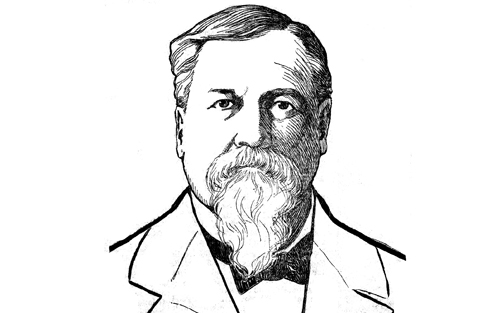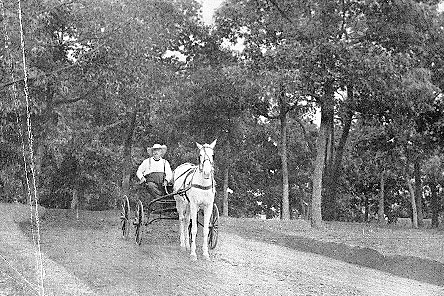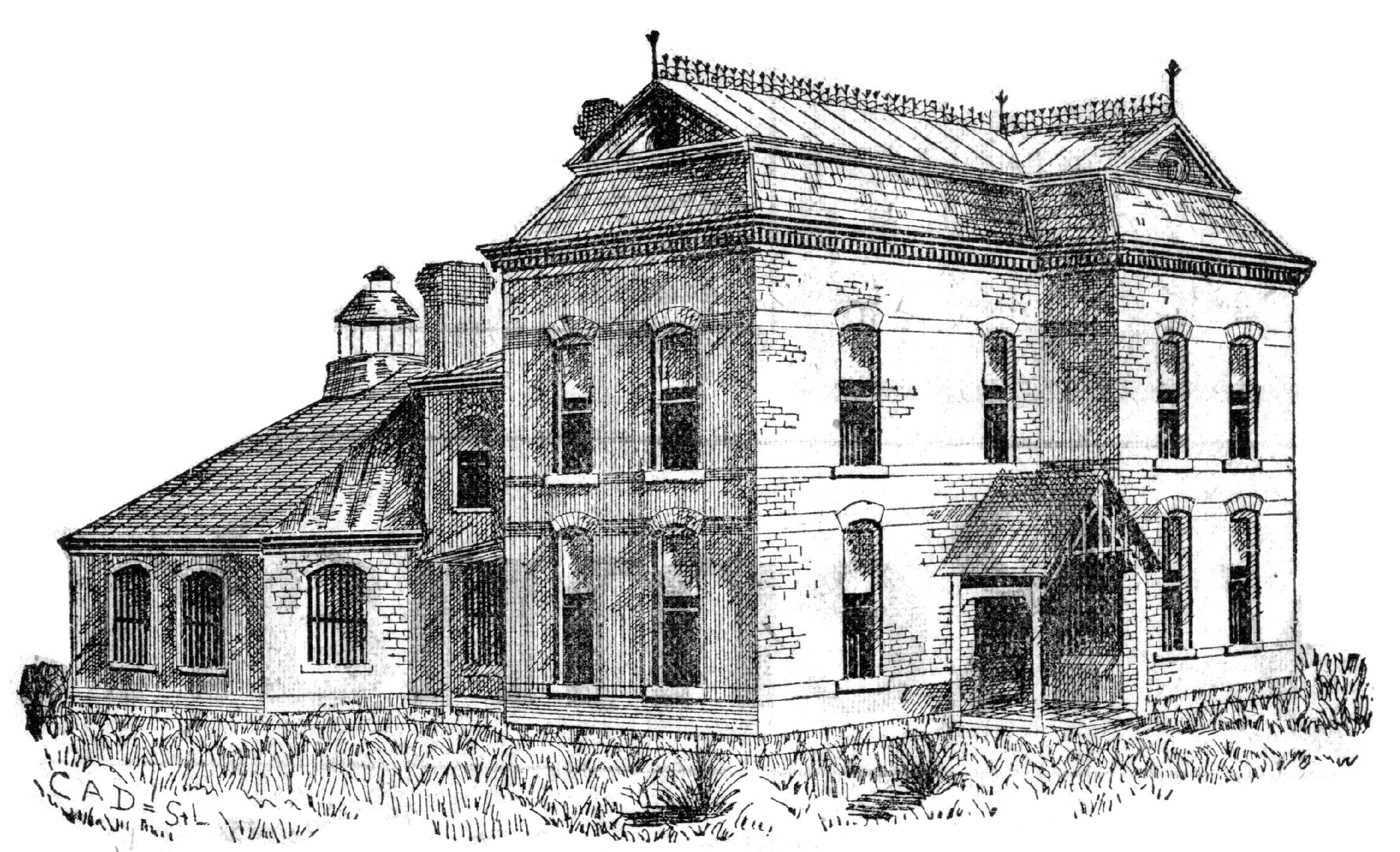There has hardly been a man, woman or child in Northwest Missouri who has not been familiar by constant repetition with the name of Alexander M. Dockery, whose career of public service has kept him almost constantly active in district, state and national affairs through an entire generation. For 16 years, Mr. Dockery represented the Third District in Congress, and during the Democratic Administration of President Wilson held the post of third assistant postmaster general.

This is an artist’s sketch of Missouri Governor A.M. Dockery of Gallatin, MO.
His active public service has obscured the fact, except in his home town of Gallatin and among his more intimate friends, that Mr. Dockery began his career as a physician, and besides several other degrees is entitled to the letters, M. D. Governor Dockery, as he is known to all his friends, was born in Daviess County, Feb. 11, 1845. His parents were Rev. Willis E. and Sarah E. (McHaney) Dockery, his father having been a distinguished minister of the Methodist Episcopal church, South.
Mr. Dockery, who is the only survivor of three children was educated in Macon Academy, Macon, Mo., and in 1863 entered the St. Louis Medical College, and was graduated in March, 1865, with the degree of M. D. He later attended lectures at Bellevue College in New York, and the Jefferson Medical College at Philadelphia and began his first practice at Linneus, Mo., and from 1867 to 1874 practiced at Chillicothe. He was recognized as a skillful physician.
In March, 1874, having abandoned the medical practice, for other lines of endeavor, Mr, Dockery removed to Gallatin and became associated with Thomas B. Yates in the establishment of the Farmers Exchange Bank, an institution which has had a solid career for nearly 50 years. He served as its cashier until 1882. Prior to his election to Congress, Mr. Dockery served as County Physician of Livingston County from 1870 to 1874, was president of the Board of Education at Chillicothe in 1870-72, was a member of the board of curators of the University of Missouri from 1872 to 1882, and at Gallatin was a member of the city council 1878-81, and mayor during 1881-83.
From 1878 until his election to Congress Mr. Dockery was chairman of the Democratic Congressional Committee of the Tenth District, 1880 was chairman of the Congressional Convention at Brunswick, and in 1882, at the conveniton at Cameron was nominated for representative in Congress. Altogether there were six men in the field for the nomination, and it was one of the most exciting conventions held in that district for many years. The deciding ballot was the 28th. The opposition had been unable to unite, since Mr. Dockery was the second choice in all the counties.
His election from the Third District came in November, 1882, and he continued as representative in Congress from March 4, 1883, to March 4, 1899. In the successive conventions Mr. Dockery was renominated without opposition. During his career in Congress Mr. Dockery was a member of the Committee on Claims, Committee on Accounts, Committee on Post Offices and Post Roads four years, and for the last ten years of his service in the house was a member of the Committee on Appropriations and had charge of the District of Columbia and the Legislative, Executive and Judicial Appropriation bills.
From 1893 to 1895 he was chairman of what is known as the “Dockery Commission,” which, among other notable achievements, devised the present accounting system of the national treasury. This system has been in successful operation since Oct. 1, 1894. During the World Fair at Chicago, he was chairman of a special committee appointed by the House to investigate and simplify methods of business. This committee’s elaborate report served as a basis for the work of organization of the Louisana Purchase Exposition at St. Louis.
While a member of the Committee on Post Offices and Post Roads, Mr. Dockery was instrumental in securing the installation of the second fast mail train service in the United States, from New York to Kansas City by way of St. Louis. In 1886, Mr. Dockery was chosen permanent chairman of the Democratic State Convention at St. Louis. At the conclusion of the eighth term Mr. Dockery declined a renomination in order to enter the race for governor in 1900. He was nominated by acclamation in June of that year, the nomination speech being made by Hon. W. S. Cowherd of Kansas City.
In the following November he was elected Governor of Missouri against his opponent, Joseph Flory, of Moberly. Taking his oath as governor, Jan 14, 1901, Mr. Dockery was chief executive of his native state four years.
After retiring from the governor’s chair in 1905 he continued active in Democratic politics, being chairman of the state convention in 1906, and in 1912 was elected treasurer of the Democratic State Committee and reelected in 1914. At the beginning of President Wilson’s administration, Mr. Dockery was appointed Third Assistant Postmaster General, his appointment being confirmed by the Senate, March 13, 1913, and he entered upon his duties March 17th. As Third Assistant Postmaster General he had supervision and control of all the extensive fiscal affairs of the postal service, including the postal saving system.
In 1906 Governor Dockery was awarded the degree of LL. D. by the University of Missouri.
In the interval between his term as governor and his recent promotion to the Post Office Department, Governor Dockery proved himself a citizen of force and influence in his home city of Gallatin. He served as a member and president of the board of education from 1906 to 1912, was president of the Gallatin Commercial Club from its organization in 1908 to 1914, and was president of the Daviess County Chautauqua Association since its organization in 1909. He was also chairman of the building committee which supervised construction of the new court house, and of the committee which supervised construction of the new Gallatin school house.

In his retirement, A.M. Dockery took great pleasure in directing improvements on the 14 acres he donated to the City of Gallatin for its municipal park. Among many interests and duties, Dockery worked as ex-officio road overseer throughout Daviess County. (1908 photo)
Of his local activities, Governor Dockery probably takes most pride in his work as ex-officio road overseer in his county, a service which he has performed gratuitously but none the less effectively at various times during the past 30 years. Governor Dockery was married April 14, 1869, to Miss Mary E. Bird, daughter of Greenup Bird. All of the seven children of their marriage died in infancy. His wife died at the Executive Mansion, Jefferson City, January, 1903.
Governor Dockery has some interesting fraternal relations. In 1880 he was elected Eminent Commander of Kadosh Commandery No. 21, Knights Templar, at Cameron; in 1881 was elected Grand Master of Missouri Masons; in May 1883, was chosen Grand High Priest of the Royal Arch Masons of Missouri, and since 1886 he has been a member of the Board of Directors of the Masonic Home of Missouri, being chairman of the Executive Committee the greater part of the time. In May, 1910, he was elected Grand Master of the Missouri Odd Fellows, and this gives him the unusual distinction of being the only person in the state who has been Grand Master of both Missouri Masons and Missouri Odd Fellows.
Beginning May, 1909, he served 12 years as president of the Odd Fellows Home Board at Liberty. Governor Dockery has been a liberal contributor and supporter to the cause of the Y. M. C. A., and is now serving as a director.
In July, 1906, Mr, Dockery donated the original land for the City Park which is now known as “Dockery Park,” which now contains 14 acres, located in the northeast part of Gallatin. The Governor is very proud of his work in building up and beautifying this park, which is a valuable asset to the city. He has been president of the Park Board since its organization. The people of Missouri have honored Governor Dockery with their confidence and respect, and have found him worthy. They have trusted in his honesty and integrity, and have always found him true.
SOURCE: HISTORY OF DAVIESS AND GENTRY COUNTIES, MISSOURI. DAVIESS COUNTY BY JOHN C. LEOPARD AND BUEL LEOPARD. ILLUSTRATED. HISTORICAL PUBLISHING COMPANY, TOPEKA- INDIANAPOLIS. 1922

